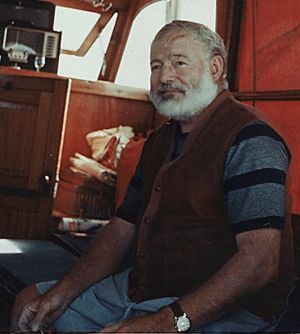Difference between revisions of "Ernest Hemingway"
(→Fascination with Androgyny) |
|||
| Line 18: | Line 18: | ||
==Fascination with Androgyny== | ==Fascination with Androgyny== | ||
| − | Hemingway evidenced throughout his work a keen fascination with [[androgyny]] and associated concepts. Despite his apparent wholesale dedication to machismo, critics have identified an undercurrent of self-awareness of an appearance of [[homosexuality]] in more intimate moments in such works as ''The Sun Also Rises''. It becomes even more evident when examining some of his unpublished works, such as ''The Garden of Eden'', wherein the protagonist's wife has their hair cut identically and experiments in the bedroom in a dominating manner. | + | Hemingway evidenced throughout his work a keen fascination with [[androgyny]] and associated concepts. Despite his apparent wholesale dedication to machismo, critics have identified an undercurrent of self-awareness of an appearance of [[homosexuality]] in more intimate moments in such works as ''The Sun Also Rises''. It becomes even more evident when examining some of his unpublished works, such as ''The Garden of Eden'', wherein the protagonist's wife has their hair cut identically and experiments in the bedroom in a dominating manner. [[Queer Theorists|Queer Theory]] have examined this trend of fascination in detail, and much speculation has been made about its origin. One prominent theory traces it back to his childhood, when his mother would dress him as a girl and pretend he was his older sister's twin - a practice which continued until he was seven or eight. |
==References== | ==References== | ||
Revision as of 17:47, April 16, 2008
Ernest Hemingway was a famous American author, born in 1899 in Oak Park, Illinois. His works include[1]:
- The Old Man and the Sea
- A Farewell to Arms
- In Our Time'
- The Sun Also Rises
- For Whom the Bell Tolls
- Hills Like White Elephants
- A Clean, Well-lighted Place
- The Snows of Kilimanjaro and Other Stories
- Dear Papa, Dear Hotch: The Correspondence of Ernest Hemingway and A.E. Hotchner
- A Moveable Feast
He won a Nobel Prize for literature in 1954[2]. In 1961 he committed suicide, but was allowed a Roman Catholic burial, as they ruled he was not fully responsible for his actions due to a mental decline in the last months of his life[3].
Hemingway influenced American literature[4]. He helped popularize a style of writing that featured plain language, short sentences, and clean, sparse prose. His writing frequently focused on American expatriates living in Europe or Africa. Leading characters are often very masculine, somewhat alcoholic, and suffering from mental scars, but they are always in control of themselves. These characters are believed to be based on Hemingway himself.
Fascination with Androgyny
Hemingway evidenced throughout his work a keen fascination with androgyny and associated concepts. Despite his apparent wholesale dedication to machismo, critics have identified an undercurrent of self-awareness of an appearance of homosexuality in more intimate moments in such works as The Sun Also Rises. It becomes even more evident when examining some of his unpublished works, such as The Garden of Eden, wherein the protagonist's wife has their hair cut identically and experiments in the bedroom in a dominating manner. Queer Theory have examined this trend of fascination in detail, and much speculation has been made about its origin. One prominent theory traces it back to his childhood, when his mother would dress him as a girl and pretend he was his older sister's twin - a practice which continued until he was seven or eight.
